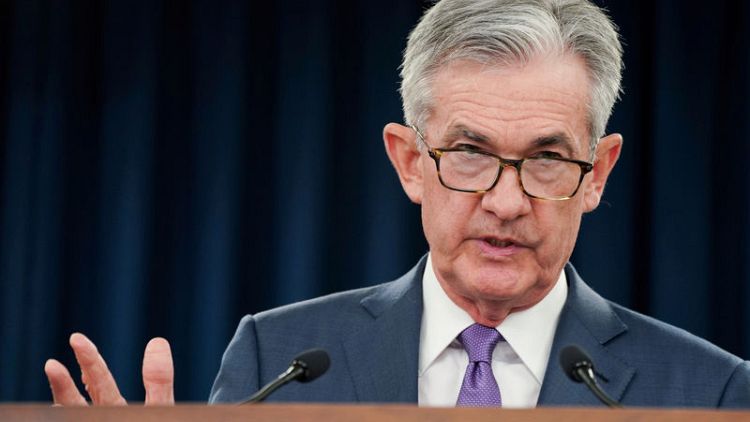By Ann Saphir, Howard Schneider and Trevor Hunnicutt
JACKSON HOLE, Wyo. (Reuters) - When Federal Reserve Chair Jerome Powell speaks in Jackson Hole, Wyoming, on Friday, traders will comb through his remarks for clues on whether the U.S. central bank will deliver more rate cuts this year.
They may be disappointed.
For all his reputation as the most plain-spoken person to run the U.S. central bank in decades, if not ever, Powell may be reluctant in his remarks to fellow central bankers at this year's Kansas City Fed economic symposium to say much about where rates will go. The reason: he may not actually know, and does not want to get locked in.
Fellow Fed policymakers, even those who supported July's rate cut, are signalling reluctance to do more, with Philadelphia Fed chief Patrick Harker calling for a wait-and-see approach and Dallas Fed chief Robert Kaplan saying he is "open minded" but would "like to avoid having to take further action."
Since the Fed cut rates in July, the U.S. economic picture has darkened.
New threats by President Donald Trump to impose additional tariffs on China, and then a decision to defer some of those new taxes until December, are boosting already heightened uncertainty for businesses.
U.S. factory activity is on the decline.
Globally, dozens of central banks are cutting rates and some economies look poised to fall into recession.
Finally, in a signal that investors are increasingly worried about a U.S. recession, yields on 2-year Treasuries sank below those 10-year debt on Thursday in yet another "yield curve inversion."
At the same time, labour markets remain strong and consumers continue to spend at stores and online.
Part of the reason the yield curve inverted is because the U.S. economy remains so much stronger than much of Europe: investors would rather have "safe" U.S. Treasuries, even with their dropping yields, than say, German bonds with a negative yield. [For a graphic, see https://tmsnrt.rs/2NqdyFy]
Beyond the conflicting economic data, dire market signals and dissent from within the Fed, Powell may also want to lay low to avoid attracting even more vitriol than he already has as the first Fed chief to be publicly called "clueless" by the president who appointed him.
"The Economy is doing really well. The Federal Reserve can easily make it Record Setting!," Trump said on Twitter on Thursday. "Be early (for a change), not late. Let America win big, rather than just win!"
Even if Powell sticks to a set piece, characterizing last month's move as a "mid-cycle" adjustment and preserving his options going forward, he could still disappoint markets and court even more turbulence.
Investors though, have high hopes that the Fed will stimulate the economy, placing overwhelming bets that the central bank will lower borrowing costs again at its Sept. 17-18 policy meeting.
(Reporting by Ann Saphir, Howard Schneider and Trevor Hunnicutt; Editing by Dan Grebler)



